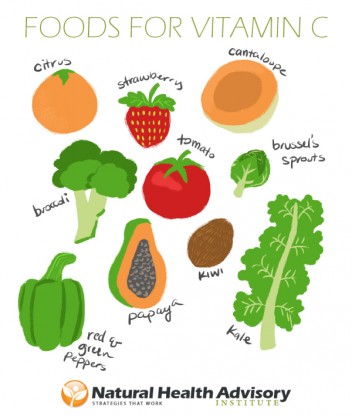What is Vitamin C Good For? 3 Top Benefits and 9 Surprising Sources
Although people may disagree on whether you should eat Paleo, vegetarian, Mediterranean, or gluten-free, everyone can agree that we should all be eating more fruits and vegetables.
One reason for this is that many fruits and vegetables contain a lot of vitamin C, which has numerous qualities that promote good health. When asking the question, “what is vitamin C good for?” the answer can range from preventing heart disease to boosting the immune system. Learn about the many uses of vitamin C in the body, and the top vitamin C sources you’ll want to make a big part of your diet.
3 reasons why vitamin C is good for you
Vitamin C benefits your health in a variety of ways:
- It boosts immunity. Vitamin C is probably most well known for its immune-boosting effects, helping to protect against things like the common cold.
- It is an antioxidant. Vitamin C is considered a very strong antioxidant, which helps it to protect against the oxidation of LDL-cholesterol and prevent atherosclerosis.[1] These antioxidant activities also help protect against many other conditions like neurodegenerative diseases.
- It helps make important structures and compounds in the body. Vitamin C is also important for the synthesis of neurotransmitters, collagen, and more.
Examples of specific conditions that can benefit from vitamin C supplementing include:
- Epstein-Barr Virus
- Osteoporosis
- High blood pressure
- Heart disease
Higher vitamin C, lower risk for death and disease
Researchers from Denmark have just found some remarkable results linking fruit and vegetable consumption, vitamin C levels, and the risk for death and disease.
They analyzed data from about 100,000 Danish people, looking at dietary patterns. They found that people who ate the most fruits and vegetables had a 15% lower risk for cardiovascular disease compared to those who almost never ate fruits and vegetables. They also had a 20% lower risk for early death from all causes.[1]
In 3,512 of those participants, the researchers also looked at plasma vitamin C levels. The higher the levels of vitamin C in the blood, the lower the risk for both heart disease and mortality.
The researchers concluded that high vitamin C intake at least partially explains the link between fruit and vegetable consumption and lowered risk for disease. Obviously, vitamin C is not the only reason that fruits and vegetables are good for your health; these foods are also good sources of many other vitamins, nutrients, and antioxidants.[1]
Best vitamin C sources
Vitamin C is not made by the body; we must eat it to get enough to stay healthy. And while you can take vitamin C in supplement form, the best way to increase your intake is by eating more fruits and vegetables that are rich in this healthy vitamin. Some of the best vitamin C sources include:

- Citrus fruits
- Tomatoes
- Red and green peppers
- Kiwi
- Broccoli
- Strawberries
- Brussels’ sprouts
- Cantaloupe
- Papaya
- Kale
It is best not to cook these vegetables too much, as vitamin C can be lost to heat; try lightly steaming for best results. Make sure to aim for at least five servings of fruits and vegetables a day, and you will be well on your way to getting plenty of heart-healthy vitamin C.
Share your experience
Do you get enough vitamin C in your diet? What vitamin C-rich foods are your favorite? Share your tips for boosting your fruit and vegetable intake – and in particular your vitamin C intake – in the comments section below.


 Ask the EN Experts March 2025
Ask the EN Experts March 2025  Vegan Diet Better Than Omnivore Diet for Cardiovascular Health
Vegan Diet Better Than Omnivore Diet for Cardiovascular Health 